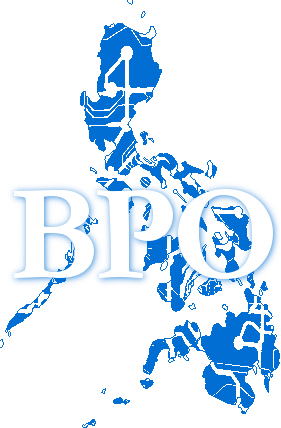

BPO in the PhilippinesBusiness Process Outsourcing in the Philippines are on the rise In the current uncertain economic environment brought on by the global financial crisis. Companies of all sizes and in all industries must adapt and innovate to become more efficient and cost conscious. Strategic partnerships with quality outsourcing providers is more important than ever. Outsourcing can improve operational efficiencies and give a competitive advantage while reducing labor costs.

Many outsourcing providers are located offshore, in other countries where wages are less than that back home. The Philippines is one such country. Labor rates in the Philippines are extremely attractive to entrepreneurs, as is their large, college educated, English speaking workforce. Outsourcing to the Philippines is increasing in frequency and scope.
he Philippines just became the “call center of the world”, employing over 500,000 Filipinos, compared to India’s 330,000 call center workers. The BPO industry is the fastest growing sector of the Filipino economy, already employing approximately 1.2M professionals. Revenues are projected to increase sharply in the coming years as companies outsource more complex and creative business processes.
Discover the rising prominence of Business Process Outsourcing in the Philippines, a top destination for quality outsourcing providers, boasting a skilled, English-speaking workforce.
Why is the Philippines becoming globally recognized as the ideal country for finding highly skilled professionals who speak great English? What is behind such astonishing growth in virtually all segments of the Filipino BPO industry? What are other reasons for the impressive gains enjoyed by the Philippines BPO industry? Here are ten reasons why.
Labor Costs
One of the main benefits of tapping into the Filipino, IT and BPO workforce is the relatively low labor cost, when compared to similar specialists in other markets. Labor costs, compared to those of other developing nations such as India, have not increased much in the Philippines in recent years. Salaries for IT professionals, tech support and call center support representatives are significantly lower than in the USA, Canada, Australia and Europe. For this reason, even leading Indian companies, such as Tata Consultancy Services, the IT services and BPO arm of India’s giant Tata Group, opened its very first BPO center in Southeast Asia this year in Bonifacio Global City, Taguig.
Culture
The Philippines is a highly westernized culture, largely as a result of it being a protectorate of the United States for nearly 50 years. Filipino culture is a combination of Eastern and Western cultures, and its strength as an outsourcing hub lies in its close affinity with the US. The Filipino legal, education and political systems are in large part based on American systems. Over one million Filipinos live in the US, and almost every extended Filipino family has someone living or working in US.
Hospitality
Filipino hospitality is legendary! The Filipino people are generally warm and extremely sensation Charice Pempengco friendly, they are also very family and relationship oriented. Although Filipinos are not the only people in the world who can be friendly and welcoming, their attitude towards other people is said to be exceptional. As a culture, they highly value being “mabait”, which is the Filipino word for “kind”. This kindness, warmth, and empathy are important characteristics that have helped Filipinos become highly successful in the BPO industry. Filipinos have developed a reputation worldwide as being extremely skilled when answering a customer complaint. This makes them ideal for customer support jobs, as Virtual Assistants (VA’), and in relationship oriented jobs where interpersonal communication skills and emotional intelligence are of paramount importance.
Strong Government Support
After witnessing the growth of the BPO industry in India, the Philippine government began promoting itself as a viable offshore outsourcing hub. Today, the industry enjoys widespread support throughout all branches of government. The Philippine Government formed the Information Technology and E-Commerce Council (ITECC) in order to promote itself as an attractive offshore outsourcing hub. The ITECC has proactively positioned their workforce to better provide the skills and services which are in high demand, including IT skills. The focus of the government’s information and communications technology policy is on five areas:
- Developing IT development zones within city planning
- Enhancing the Philippines information infrastructure
- Promoting services to potential clients
- Providing a regulatory environment which is conducive to growth
PEZA

PEZA, short for Philippine Economic Zone Authority, which is a part of the Department of Trade and Industry, is the Philippine government agency tasked to promote foreign direct investment, extend assistance, register, grant incentives to and facilitate the business operations of investors in export oriented manufacturing and service facilities inside selected areas throughout the country. BPO companies in the Philippines may opt to register with (PEZA) which entitles them to many benefits, including an income tax holiday for three to eight years. After that, PEZA registered BPO companies are subject to only a 5% tax on gross income (in lieu of all local and national taxes). PEZA is just one of the many ways in which the Philippine government encourages economic growth in the BPO industry by enacting favorable tax and regulatory policies designed to encourage direct foreign investment.
IT Infrastructure
The Philippines enjoys high Internet penetration, with some estimates placing the number of Internet users as high as 24 million people. The country has a sophisticated cellular phone industry, and a high concentration of users. Text messaging is extremely common in Philippines, where approximately 2 billion text messages are sent every day.
Human Capital
The Philippines enjoys an abundance of disciplined, highly educated and native English speaking professionals. Over 400,000 university graduates join the workforce every year, many of which are graduates in IT, or IT related or engineering fields. Many top universities and institutions of higher learning are now offering outsourcing industry related curriculum, certifications, degrees, and advanced degrees. This provides for a large and varied workforce for potential employers. Many IT companies, including Indian companies, are moving to the Philippines precisely because of its considerable reserve of highly skilled IT professionals waiting to be tapped, especially in the fields of software development. Filipino professionals are now recognized worldwide for their credibility and expertise in many fields including communication, education, finance, health care, science, research and IT. Manila, the capital of the country and home to its largest and most highly skilled labor pool, is recognized as worldwide as a major outsourcing center. Filipino professionals are also particularly noteworthy for their marked customer service orientation, superior work ethic, high degree of trainability, flexibility, multicultural adaptability, and loyalty.
Strategic Location
The Philippines 7,107 islands stand strategically at the crossroads of regional and international trade. The country is an ideal access point to all of Asia – currently the fastest growing region in the world. International flights are inexpensive to and from the Philippines, and flight times are short to major cities across Asia. From the Philippines, its just two hours by air to Taipei or Hong Kong, and four hours from Tokyo and Seoul. It takes around nine hours to fly to Australia. It is also relatively close to the United States, with only a 12 hour flight from Los Angeles to Manila.
Proven Track Record
Many multinationals, as well as small and medium sized businesses, when faced with the important decision of where to outsource, and for whom to partner with, try to avoid investing in countries which are too risky, or lack a proven track record. Over the last ten years, the Philippines has proven to be a world leader in many segments of the BPO industry. The Philippines has a proven track record of success. Numerous Fortune 500 companies are already taking advantage of the unique benefits available from outsourcing in the Philippines.











